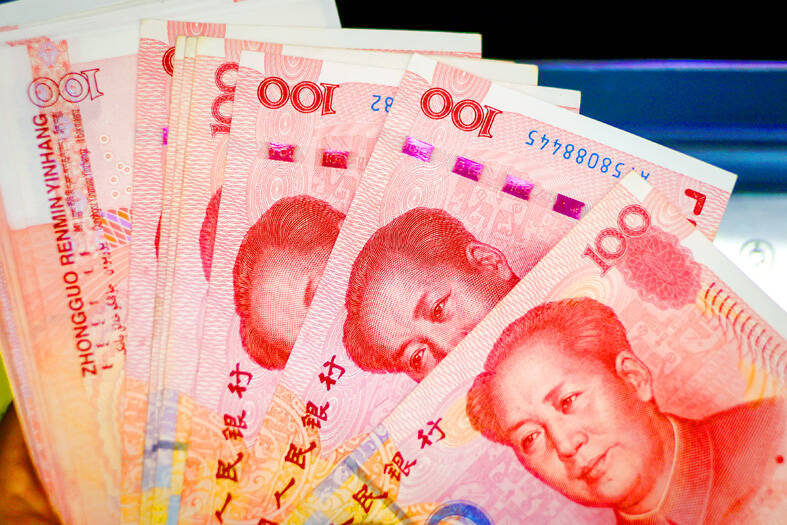Onshore yuan-denominated deposits last month slid for the 12th consecutive month to 162.529 billion yuan (US$22.3 billion), a 2.28 percent decline from a month earlier and the lowest in nine-and-a-half years, data released by the central bank showed yesterday.
The monthly decrease of 3.795 billion yuan from 166.324 billion yuan in June came as investors continued to lose interest in the Chinese currency amid deteriorating sentiment toward the country’s economy and growing worries about its financial turmoil.
Onshore yuan deposits include those at local banks’ domestic banking units (DBUs) and those at offshore banking units (OBUs) in Taiwan.

Photo: EPA-EFE
Central bank data showed that yuan deposits at DBUs decreased 5.71 percent from the previous month to 127.544 billion yuan, while those in OBUs increased 12.65 percent to 34.985 billion yuan.
While the US Federal Reserve’s rate hike cycle is widely expected to be nearing its end, US dollar deposits have continued to attract interest among institutional and individual investors given its bigger interest spread compared with yuan deposits, the central bank said.
Based on information provided by the central bank, Bank SinoPac (永豐銀行) offers the highest interest rate in Taiwan for one-month yuan deposits at 3.05 percent, while Sunny Bank (陽信銀行) provides the highest rate for three-month deposits at 1.9 percent.
The highest interest rate for six-month, nine-month and one-year yuan time deposits are 2.1 percent at the Bank of Kaohsiung (高雄銀行), 1.35 percent at Land Bank of Taiwan (土地銀行) and 2.2 percent at Sunny Bank respectively, the data showed.
In other news, the Financial Supervisory Commission yesterday said that 22 institutional investors in Taiwan had bought a combined NT$170 million (US$5.32 million) of corporate bonds issued by financially troubled Chinese property giant Country Garden Holdings Co (碧桂園).
Country Garden failed to pay two US dollar bond issues worth US$22.5 million that were due on Aug. 6, and suspended trading of 11 of its domestic bonds from Monday.
The 22 Taiwanese investors had bought Country Garden bonds through five Taiwanese banks, but they are not those that defaulted, the commission said.
Meanwhile, domestic investment trust companies have a combined NT$1.7 billion exposure to Hong Kong-listed Country Garden, it added.

Semiconductor business between Taiwan and the US is a “win-win” model for both sides given the high level of complementarity, the government said yesterday responding to tariff threats from US President Donald Trump. Home to the world’s largest contract chipmaker, Taiwan Semiconductor Manufacturing Co (TSMC, 台積電), Taiwan is a key link in the global technology supply chain for companies such as Apple Inc and Nvidia Corp. Trump said on Monday he plans to impose tariffs on imported chips, pharmaceuticals and steel in an effort to get the producers to make them in the US. “Taiwan and the US semiconductor and other technology industries

SMALL AND EFFICIENT: The Chinese AI app’s initial success has spurred worries in the US that its tech giants’ massive AI spending needs re-evaluation, a market strategist said Chinese artificial intelligence (AI) start-up DeepSeek’s (深度求索) eponymous AI assistant rocketed to the top of Apple Inc’s iPhone download charts, stirring doubts in Silicon Valley about the strength of the US’ technological dominance. The app’s underlying AI model is widely seen as competitive with OpenAI and Meta Platforms Inc’s latest. Its claim that it cost much less to train and develop triggered share moves across Asia’s supply chain. Chinese tech firms linked to DeepSeek, such as Iflytek Co (科大訊飛), surged yesterday, while chipmaking tool makers like Advantest Corp slumped on the potential threat to demand for Nvidia Corp’s AI accelerators. US stock

The US Federal Reserve is expected to announce a pause in rate cuts on Wednesday, as policymakers look to continue tackling inflation under close and vocal scrutiny from US President Donald Trump. The Fed cut its key lending rate by a full percentage point in the final four months of last year and indicated it would move more cautiously going forward amid an uptick in inflation away from its long-term target of 2 percent. “I think they will do nothing, and I think they should do nothing,” Federal Reserve Bank of St Louis former president Jim Bullard said. “I think the

SUBSIDIES: The nominee for commerce secretary indicated the Trump administration wants to put its stamp on the plan, but not unravel it entirely US President Donald Trump’s pick to lead the agency in charge of a US$52 billion semiconductor subsidy program declined to give it unqualified support, raising questions about the disbursement of funds to companies like Intel Corp and Taiwan Semiconductor Manufacturing Co (台積電). “I can’t say that I can honor something I haven’t read,” Howard Lutnick, Trump’s nominee for commerce secretary, said of the binding CHIPS and Science Act awards in a confirmation hearing on Wednesday. “To the extent monies have been disbursed, I would commit to rigorously enforcing documents that have been signed by those companies to make sure we get